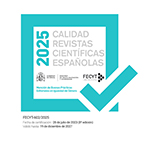Empujando los límites: la expansión de la intimidad en los talk shows (1990-2010)
Resumen
El talk show como género televisivo en España se extendió por todos los horarios y formatos durante las dos décadas estudiadas (1990-2010). En ese tiempo desarrolló sus propias reglas sobre cómo presentar la intimidad en televisión: la telerrealidad no significaba el fin de la privacidad, sino el inicio de su expansión. Este artículo analiza la evolución del talk show, desde los formatos más tímidos que limitaban la exposición emocional, hasta aquellos influenciados por el éxito de Big Brother, que obligó al género a gestionar la intimidad de las personas de la forma más espectacular posible en la lucha por el share. Esta búsqueda permanente de audiencias llegó a provocar que el talk show excediera los límites de la autenticidad y utilizase la ficción y el espectáculo, alterando la realidad por motivos utilitarios para hacerla más entretenida e introduciendo actores y presentadores que incitaran al conflicto e incluso al engaño.
Descargas
Descarga artículo
Licencia
La revista Estudios sobre el Mensaje Periodístico, para fomentar el intercambio global del conocimiento, facilita el acceso sin restricciones a sus contenidos desde el momento de su publicación en la presente edición electrónica, y por eso es una revista de acceso abierto. Los originales publicados en esta revista son propiedad de la Universidad Complutense de Madrid y es obligatorio citar su procedencia en cualquier reproducción total o parcial. Todos los contenidos se distribuyen bajo una licencia de uso y distribución Creative Commons Reconocimiento 4.0 (CC BY 4.0). Esta circunstancia ha de hacerse constar expresamente de esta forma cuando sea necesario. Puede consultar la versión informativa y el texto legal de la licencia.










